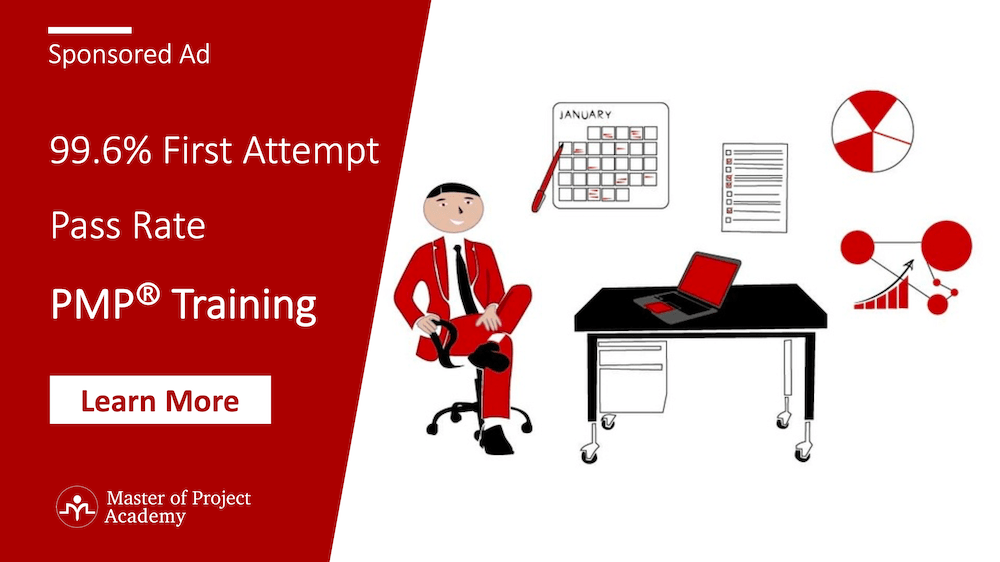Are you a project management aspirant and looking for a PMP study guide? So this is the article that you must read as in this article, we are going to share with you a PMP Study Guide including the 7 steps to your PMP success. We wrote this article because we understand the passion and the motivation of the PMP aspirants to fully explore the ways to move forward with the PMP Certification.
PMP Study Guide Can Help You Bring professional rewards
The dynamic global market always has demands for the project manager role to ensure the challenging projects turn into success and add value to the organization. This brings a lot of opportunities to project management professionals. So what could be better than acquiring the PMP credentials if you want to pursue your career in the project management field? PMP credential is an endorsement of recognized skills and knowledge of the professionals.
In addition to this, there are many benefits PMP brings to qualified professionals. The PMP exam is not an easy task. It requires the candidates to fully prepare for the PMP Exam. Likewise, project management aspirants look for the possible ways that can help them to get them well prepared for the PMP Exam. The PMP certification requirements are quite demanding for the aspirants and it is not easy to clear the exam unless you are fully equipped with a PMP study guide to qualify for the exam.
Rewards of PMP Credential
There are many advantages you can reap after you got your PMP certification. When you have your PMP certification you will have a big advantage over your peers who are non-certified. Some of the major benefits of PMP certification include:
Global Recognition of Skills:
- The PMP validates your understanding of the overall context of the methods. Therefore, PMP offers best practices, the latest developments in project management and the ability to learn tricks and techniques. This is what gives you an advantage over others.
- Your colleagues and communities will see you as a coach and mentor based on both your credentials and your practical experience.
- You feel more assured that you are at the forefront of your distinguished accomplishment, which provides a strong base for your career development.
You Are Recruiters’ Favorite:
- Recruiters look for the best-fit candidates who can add the values which make them more appropriate for the projects. Because the value that you would add to their organizations will make their profiles more prominent.
- PMP credentials help organizations to get better scores while procuring project management services.
- The PMP certification stands out as an endorsement of the candidate’s expertise, skills, and experience. It makes it much easier for hiring managers to test applicants with such endorsements.
- Most organizations make it compulsory for candidates to have PMP certification.
Improvement of Salary:
- You may expect a hike of at least 20% in your salary after obtaining your PMP Certification.
- The project managers within various industries earn higher salaries as compared to their non-PMP peers within the same industries. You may review the average PMP salary you would earn by industry, experience, and location.
-
PMP certification also increases job stability, because even with fewer positions on the market,businesses will be more interested in recruiting and retaining PMP accredited project managers.
In this section, we will talk about the different steps of the PMP Study Guide.

PMP Study Guide – Step #1
This is the very first step of the PMP study guide. Because first, you need to know what you need to do in order to attain your objective. So for PMP certification, you need to know the PMP Certification requirements that are set out by PMI. Knowing these requirements will help you set out your PMP study plan for the PMP Exam. The main aspects that set by PMI as PMP exam criteria include education, experience, and training. These very well defined criteria are good enough to assess the knowledge, experience, and approach of the PMP candidates. The following table depicts the PMP exam criteria:
| Education | Project Management
Experience |
Project Management
Education |
| Non Graduates | 5 years/7500 hours | 35 hours |
| Graduates | 3 years/4500 hours | 35 hours |
Let’s discuss these PMP certification requirements a little bit more in detail.
Education
Education is the foundation requirement of the PMP Exam. According to the criteria you should have at least have a high school diploma or associate’s degree or global equivalent. If you have a graduation degree it is a plus as it will reduce the work experience requirement from 5 years to 3 years.
Experience
The experience requirement is subject to your education level. In case you have a bachelor’s degree, the required experience is 3 years (36 months) which you can interpret as work experience of 4,500 hours. You must have experience of at least 4,500 hours if you are planning to sit in the PMP Exam provided you have a bachelor’s degree. Likewise, if you have a high school diploma or associate’s degree or global equivalent the required experience is 5 years (60 months). In this case, you require work experience of 7,000 hours to fulfill the criteria.
Training
PMP training requirement is a must to sit in the PMP Exam. According to PMI criteria, you must have 35 contact hours of PMP training. So you must include a formal PMP training to your PMP study guide. For this requirement, you may explore many options available in the global market.
PMP Exam Application – Requirements
Though you have to fulfill the aforementioned PMP exam requirements before applying for the PMP Exam, however knowing how to fill your PMP application is also important at this stage. Please note that you should also keep in mind while filling in the application that PMI may randomly select your application for the audit. All you have to do is to arrange for the evidence for what you have claimed in your PMP Exam application.
Education: You need to fill in the details and level of your degree you have qualified while applying for the PMP Exam.
Experience: If you have worked on projects in any capacity, you should be able to claim these hours depending on the different phases of the project that you have been working on. Based on your education, you should specify your projects and your effort in terms of time. So you can cover the required time span based on your education. For each project, you should mention the start date and the end date. During each project time, you should mention your effort in terms of hours within each phase of the project.
Training: As you are applying for the PMP Exam when you already have your training certificate of 35 PDUs so filling in the details of the training is quite simple.
PMP Study Guide – Step #2
Now you know the different aspects of the PMP exam requirements, let’s move to the 2nd step of the PMP study guide. Obtaining professional training should be your second step in your PMP study guide. Training is a mandatory requirement to sit in the PMP Exam. This requirement seems very simple but it is quite tricky as you need to choose one training from many options provided by different vendors. Many of the vendors are available who provide the PMP trainings. Now what you choose should be based on a good assessment of the training provider.
Choose your training programs
The second step of the PMP study guide is important because the PMP exam is not a simple exam. It is more likely that the candidates have a higher tendency to fail the PMP exam if they are not well prepared. That’s why when assessing the training providers you should not keep any redo scenario in case. In other words, you should choose the one that can help you get your mission accomplished in a single try. So you do not have to repeat the trainings and preparations again. Generally, there are various aspects you should consider to filter the most feasible option:
- Whether the training is comprehensive and covers all the aspects of the PMBok?
- Will the training satisfy the PMP exam criteria of 35 PDUs?
- Whether I should opt for classroom training, virtual online or e-learning training format?
- What is the study material I will get with the training?
- What is the duration of the training?
- Will the training give me the flexibility to follow my own pace or do I have to follow any stringent schedule?
- Are there any mock-up tests and quizzes?
- Are there any testimonials of the training provider?
- What is the success rate of the training provider?
- What is the reputation of the training provider?
- Is the training cost feasible for me?
- Will I get a better return on investment?
These are the few consideration points that you need to keep in mind while assessing the training providers.
Training
When you are choosing the training, you need to select the training format. In other words, the choice of training format will be the first step to move forward with the training. Candidates choose the training format as per their feasibility. You can look for the following training formats and make a choice according to your priorities to fulfill PMP training requirements. These formats include:
-
In-person Classroom Training
In this format, training providers offer instructor-led training within their premises. These trainings are generally of a duration of 4 days which fulfils 35 contact hours requirement of PMI to sit in the PMP Exam. Training providers publish their calendars on their website so the candidates can find and select the training with respect to dates and locations. If you opt for this training you will have to follow the schedule and be on the premises for the training sessions. This may be a hassle if you are working on tight deadlines as these sessions do not have the flexibility of repeat. Once you miss the class you will have to find ways to cover up the gap with your colleagues or through the provided material.
There are some cases when the candidates have the flexibility to adjust their schedules or they are willing to attend the classroom trainings. Such candidates find in-person classroom training the best option.

-
In-person Virtual Classroom Training
Another option of PMP training format is the virtual classroom training format. In this format, you also get instructor-led training. But this training is carried out in a virtual environment so you do not have to travel to a specific venue to attend the class. All you need is a computer and an internet connection. Or you can even connect using mobiles or portable devices. This format provides flexibility in terms of commute as you do not need to travel to attend the class and you can just join the class from anyplace. However, following the timing is important.
When candidates look for in-person trainings but they are not willing to travel to attend the class. Hence, Virtual Classroom training can be a good option for such candidates.
-
E-learning Online
Another option that gives a lot of flexibility to the candidates and also provides a lot of expansion in the outreach of the training providers, is the e-learning format. In this format, you are not bound to follow any specific date and any specific location. So you get the flexibility to learn at your own pace. Generally, you get duration based access to the extensive material produced by the training providers. There are many cases where the candidates look for flexibility in terms of both location and time. Such candidates prefer the e-learning format.
These trainings are great events that prepare you for the certifications. Considering that the aspirants are professionals and must be busy in their jobs, finding time to attend the training could be a bit difficult for them.
PMP Study Guide – Step #3
Once you get the PMP training, you are on the next step of the PMP study guide and it is to prepare and assess yourself for the PMP Exam. At this stage of the PMP study guide, you must have already gone through the formal training for PMP exam preparation. But during this self-study period, you should start your practice through the materials you have been provided during the training. On top of that, you can prepare your own notes which can help you reinforce your learning while taking notes you should follow a PMP prep book.
As you know, PMI offers various benefits to the registered members. You will have free access to download standards, guides and other valuable material relevant to project management. This also includes the Project Management Body of Knowledge (PMBOK). The entire content is available on PMI’s website pmi.org.
You can even prepare your own flashcards. These are the best tools to revise the main points. As these are just short notes of the topics. So instead of going through long study material, you can review and remember with the help of these short notes. You may also acquire flashcard products from training providers as training providers also offer such products for the ones who are willing to buy these additional products and get an advantage during their preparation. However, when you opt to buy flashcards from the market, you certainly have to pay for such tools.
Many well-known education providers have prepared flashcards which are available in different qualities and numbers. For instance, you can look for RMC Hot Topics Flashcards, or you can find Flashcards (Test Prep) by Crowe, Andy as well as the reasonably priced flashcards from Master of Project Academy.
PMP Study Guide – Step #4
Once you have completed your PMP exam materials, it is time to move to the next level of the PMP study guide and it is to start practicing with PMP practice questions. For this step of your PMP study guide, you can find a variety of quizzes, practice exam mock-ups being offered by training providers. In addition to this, the practice exams are also being offered as separate products by those training providers.
The training programs provide you with the study material that may include quizzes, games, practice tests, and simulations. In this way, you can assess your readiness for the exam, identify the preparation gaps and cover them with the revisions.
For this step of your PMP study guide, you should start first with the quizzes and PMP questions that are provided during the training. Then you can expand your practicing horizon. You can start finding questions on the internet and try solving them. This will help you get more and more practice as you will see a variety of questions and keep on looking for the answer in various scenario-based questions.
Another approach is to dive deep into the test environment and mock practice. You can look for exam simulators and with them, you can get the feeler of the actual exam. You can practice through these exam simulators to assess your time management and response accuracy. Thus it will enable you to identify your strengths and weaknesses. Once you identify these areas you can prepare for your specific areas and cover any gaps you identify during these the simulations.
Exam Simulators
Many training providers also offer the exam simulators as an individual product, for instance, RMC and Master of Project Academy. RMC offers the PM Exam Simulator. You get 90-day access to practice 1600 plus sample PMP Exam questions. Also, Master of Project Academy provides a PMP Exam Simulator consisting of 7 simulation exams or a total of 1400 PMP online exam questions. They offer a lifetime access plan or a monthly plan which gives flexibility to the candidates to choose as per their feasibility.

PMP Study Guide – Step #5
Now comes the most crucial part of the PMP study guide that shapes up the improvisation. At this stage of the PMP study guide, you must already have gone through the study material and started practicing through tests, quizzes and simulations. You need to review your performance in these tests, practice sessions, and quizzes. So try to note your performance and identify your strengths and weaknesses. This will help you ratify your positioning.
Once you identify your weak areas, you definitely need to strengthen your knowledge in these areas. In this regard, you will have to go through your notes and ensure the base concept is learned and the mapping of the concept with the specific situations is also clear. So you are fully equipped to attempt such situation based questions in your PMP Exam.
Further, you also need to frequently go through the topics that are identified as your strength in the previous practice tests. First, you need to ensure that your understanding is reinforced in these areas and you can be an expert in these areas. In this way, you can secure better marks through your areas of strength.
I would suggest that after some practice and reinforcement, you should be able to start coaching. You do not need to be a professional coach to start this. Besides, you can start looking at the PMP questions that other candidates have asked for clarification and understanding. You can join different PMP forums for this purpose.
PMP Study Guide – Step #6
If you can score over 70% from practice tests, you can schedule your PMP exam. This is the 6th step of your PMP study guide. Go through your PMI profile and schedule your PMP exam. In order to schedule the PMP exam, you must have registered for your PMP exam with PMI and you should have received your authorization to test prior to scheduling your test appointment at Pearson VUE testing locations. After authorization from PMI, you will have one year to schedule the PMP exam date and take the exam. If you do not sit for the PMP exam in one year, you will have to restart your PMP application.
Scheduling through Pearson VUE
Provided you meet these pre-requisites you can set your appointment by logging in to PMI.org and navigate to Schedule Exam. This will direct you to schedule your exam through Pearson VUE from where you can select your exam for which you are authorized. Once you select your exam, the screen will display the booking method options available. You will be scheduling your exam for a future date at a test center.
PMP exams are conducted by Pearson VUE test centers. However, Pearson VUE test centers do not offer only the PMP exam. There are several other certifications, language and skill tests offered by these test centers. You will have to schedule your test as per the availability of the slot in the test center of your choice. Based on the available slots, you can book one for your PMI Exam. So you can set the date and time of the PMP online exam you want to sit in. Depending on the location and business of the test center, you might not find an early available slot for your PMP exam date. Therefore, it is recommended that you schedule your PMP exam at least one month before the date you plan to sit for the exam
In the meantime you still can get ready for the exam date, go over your notes and continue practicing.
PMP Study Guide – Step #7
Now is the final step of the PMP study guide. This is the time to sit for the PMP exam and get your PMP certification! Before the exam day, you should get good sleep and get rest so you can feel fresh at the time of the exam. Another key factor is that you should be cool and calm. Also, there should be no sign of stress. In the previous steps of the PMP study guide, you have practiced frequently so that it must become your norm now.
On the day of your examination, please arrive 15 minutes before your scheduled appointment. You must sign in, present the required identification and provide your PMI ID number. In addition to this, you may also be asked to provide the confirmation number you received when scheduling the appointment. Furthermore, you should have your identification documents with you. These may include government-issued identification. The identification must be current and must match your name exactly as it appears on the scheduling notification, for example, a valid driver’s license, valid passport or valid national identification card.
What is the PMP Exam?
PMP exam is a computer-based online exam of 4 hours of duration in which you have to attempt 200 Multiple Choice Questions. PMP online exam has questions with four options, of which you need to pick one correct answer. There is no negative marking but the positive responses count towards the passing score. You can take breaks but the timer will not stop so if you plan to have short breaks during the examination you must keep in mind that it will reduce the time to attempt the questions.
Read the questions carefully and eliminate the incorrect answers from the provided choices. Choose the most appropriate according to the context of the question. You can mark the questions that you feel you need to answer later or you need to review later during the exam. If you complete your PMP exam and you still have time left, you can spend this time to review your answers.
Once you complete the test by pressing the submit button or the duration of the test is lapsed. The online test allows you to receive your score immediately. Provided you have passed the PMP online exam you get the “Congratulations” message on the screen. So your mission is accomplished!
Upon passing, you are approved to use the PMP credential for 3 years. Once you got the PMP, you must earn 60 PDUs every three years to retain your certificate, so do not forget to earn and report PMP PDUs.

PMP Study Guide – Summary
In this article, we shared with you a PMP Study Guide with 7 steps to help your PMP success. The PMP study guide takes your step by step from knowing the PMP requirements to appearing in the PMP Exam. Once you know the PMP requirements, you will need to obtain professional training. In this step of the PMP study guide, we discussed various formats that are available for the training. Also, we reviewed what you need to consider to choose the training program that is ideal for you.
Once you obtain the training, you need to prepare and then assess your readiness for the PMP exam. In this step of the PMP study guide, you will have to review your performance in these tests, practice sessions, and quizzes. So try to note your performance and identify your strengths and weaknesses. If you can score over 70% from practice tests, you can schedule your PMP exam. This is the 6th step of the PMP study guide, Go through your PMI profile and schedule your PMP exam. Finally, we arrive at the last step of the PMP study guide: the time to sit for the PMP Exam and get your PMP certification!
We hope the PMP study guide will help you in your PMP exam preparation and you find this article helpful to achieve the PMP certification.



